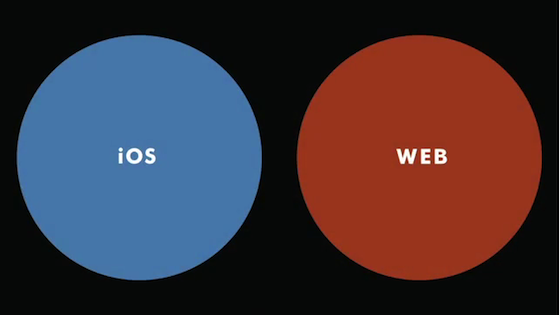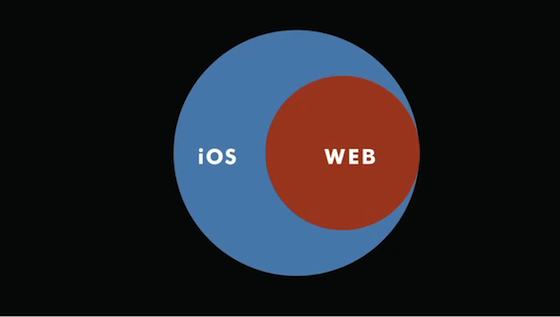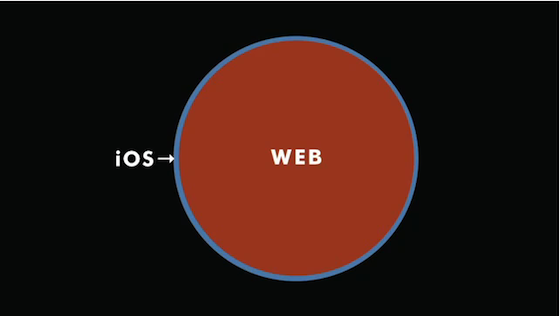This article is more than 1 year old
Fanboi king hails Apple 'love affair with open web'
The high comedy of web hypocrisy
Macworld When Google yanked the royalty-encumbered H.264 video codec from its Chrome browser, saying its goal was to "enable open innovation", John Gruber promptly convinced an army of tech pundits that Mountain View was guilty of an epic hypocrisy.
"Chrome not only supports Flash, it ships with its own embedded copy of Flash. I don’t see how Google keeps Flash but drops H.264 in the name of 'openness' without being seen as utter hypocrites," the Apple fanboi king wrote on his ever-so-widely read Daring Fireball blog. And within minutes, countless commentators joined the chorus.
As Google seeks to build WebM into a standard royalty-free video codec, it's certainly worth pointing out that the company's claims of "openness" don't exactly jibe with its desire to keep Flash on YouTube. But Google is hardly the only one applying whatever meaning it likes to the word "open". These days, the word is good for nothing more than high comedy. As he blasts Google for calling itself open in the face of continued support for Flash, Gruber is at the same time calling Apple an open web company.
"I'm here to talk about Apple's relationship with the open web," the über blogger told gathered fanbois on Wednesday afternoon at Macworld Expo in downtown San Francisco. "It is my goal to convince you that this is not a story of conflict, that this is – in fact – a love story."
In October, as Steve Jobs unveiled his new Mac App Store and the store's predictably draconian terms of service, some accused the man of attempting to sidestep the web entirely. "I wonder when Apple will stop shipping Safari," Firefox development chief Mike Beltzner said. "It's obvious already from today's keynote that they're looking to bypass the web."
But John Gruber bristles at such talk. "Apple has benefited tremendously – perhaps more than [from] anything else over the last fifteen years – from the rise of the web," Gruber said Wednesday. "And the web has been improved greatly by efforts from Apple – the open web, not the proprietary closed web."
Gruber acknowledged that Apple isn't a web company in the vein of Amazon or Google. But he argued that Apple is a different kind of web company – a web company that operates, well, outside the browser. "Apple is very much an http company," he said. "Every single song you buy from the iTunes store – how is it getting from the store to your computer or device? http. Every single app you download? How is it delivered from the store to your Mac or your iPhone or the iPad? http. Take away Apple's access to http, and there is no App Store – at least not as we know it. ... In this sense, Apple is a web company.
"Web 1.0 was html in a web browser. Web 2.0 – I'm gonna say – is http everywhere. It's a different kind of web. It's a web that is not constrained in the rectangle of the browser."
We should point out here that in our world, the general consensus is that the web without the browser isn't the web. It's the internet. What's more, if you bypass the browser's open standards, you're restricting users to your own little world, as the web's creator recently argued. "Not using open standards creates closed worlds," Tim Berners-Lee wrote last December in a piece that, shall we say, clashes with Gruber's view of iTunes. "Apple’s iTunes system, for example, identifies songs and videos using URIs [uniform resource identifiers] that are open. But instead of 'http:' the addresses begin with 'itunes:,' which is proprietary.
"You can access an 'itunes:' link only using Apple’s proprietary iTunes program. You can’t make a link to any information in the iTunes world – a song or information about a band. You can’t send that link to someone else to see. You are no longer on the Web. The iTunes world is centralized and walled off. You are trapped in a single store, rather than being on the open marketplace. For all the store’s wonderful features, its evolution is limited to what one company thinks up."
Gruber went on to point out that Apple started the open source WebKit project, which now underpins both Apple's Safari and Google's Chrome, among so many other browsers. "Even if we stick with web browsers," he said, "I'm going to argue that the best web browsers are based on Webkit rendering engine ... Safari and Google Chrome." We'd leave Safari off that list, but otherwise, this is true. He's also right that WebKit has played an even bigger role on smartphones. But there's a difference between an open source browser project and an open web.
Predictably, the meat of Gruber's argument is that iPhone and iPad handle web video with the HTML5 video tag rather than Flash. "Flash is closed, and HTML5 is open," he said. "Anytime anyone makes an argument about open and closed, when they say open, they mean good, and when they say closed, they mean bad. I'm right here to tell you now that Flash is bad and HTML5 is good."
Steve Jobs has made similar noises. "Though the operating system for the iPhone, iPod and iPad is proprietary, we strongly believe that all standards pertaining to the web should be open," Jobs said in his infamous "Thoughts on Flash" missive. "Rather than use Flash, Apple has adopted HTML5, CSS and JavaScript – all open standards." But Apple undermined much of this argument months ago when it unveiled an "HTML5 showcase" site that ran only in Safari.
"Basically they are saying internally 'omg, no one thinks we support html5, we need to prove them otherwise! If you’re not on Safari, then Fuck You. We’ll put up tests! Demos! The world will then know and we can go back to being perceived as actually leading the WebKit project which is also made of puppies and rainbows!'" wrote Mozilla man Chris Blizzard, in response to Apple's, um, showcase.
"So you end up with sites like this," Blizzard continued. "Sites that entirely miss the point of the web, interoperability, standards and html5. The demos that they put up are just filled with stuff that Apple made up, aren’t part of HTML5 and are only now getting to the standards process."
We should also point out that with the HTML5 video tag, Apple only supports the H.264 video codec. Though Gruber mentioned H.264 during his prepared talk, he didn't mention that it carries royalty fees. But after the talk proper, he was asked how he reconciled his Apple-is-open argument with the company's unwavering stance on H.264. No, it wasn't a fanboi who asked. It was us.
"If Apple is a fan of the open web, why are they backing H.264? I think it's for practical purposes," he said. "H.264 has a very rich ecosystem. ... It's the best format that was available, and their lawyers agree that it's the best compromise industry-wide."
So, Apple is open except when it's not.
Gruber eventually acknowledged that outside of fanboiland, many are concerned that Apple's App Stores will supersede the web, putting the net in the hands of one outfit. "The fear that some people have – what gives the proponents of the open web the heebie-jeebies about Apple – is the idea that as the App Store succeeds, it will extinguish the web and then all of a sudden shift from the state where the web is under no one's control ... to a situation where it's under the control of one organization," he said.
But then he said people shouldn't worry about this because it'll never happen. "The App Store is thriving, growing, accelerating at an amazing rate, but it hasn't dampened the enthusiasm for the web," he said. "It's like a false fear."
In the end, Gruber pulled out the Venn diagrams. This, he said, is how the world views Apple's iOS in relation to the open web:

But then he said it looks more like this:

And then he said it may even look like this:

You could argue, he said, that "the web is the biggest thing and iOS just this thin proprietary layer on top of it." You could. If you were playing for laughs. If Google is guilty of hypocrisy, so is Gruber. As is Apple, whose views Gruber is merely repeating. If we were sensible, we'd call on the entire industry to retire the word "open". But we're not. The farce is just too much fun. ®
Bootnote
Gruber gave a similar talk this fall at the Web 2.0 Expo in New York. You can see it here:
